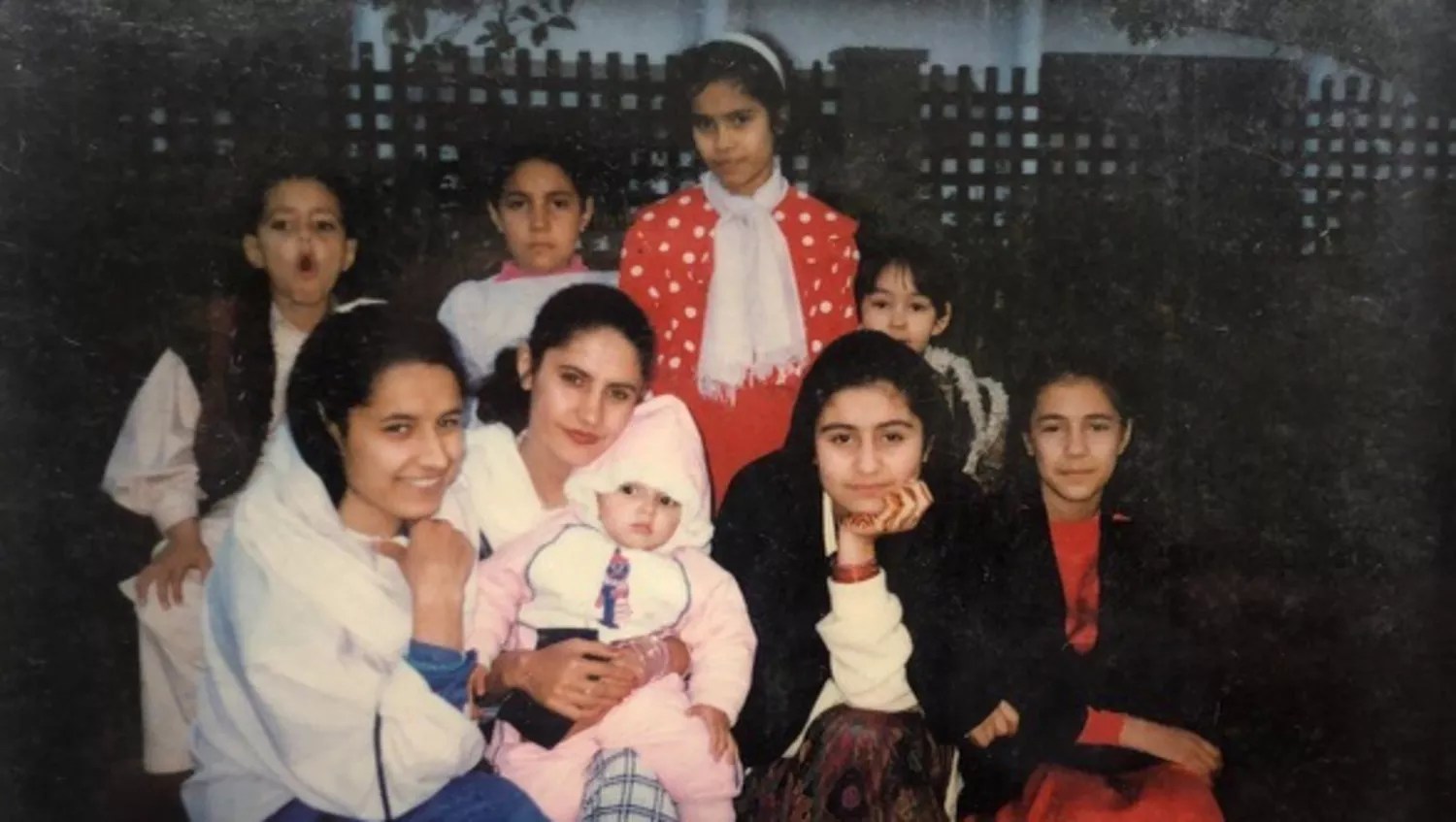
Courtesy of Elham Mansoory

Audio By Carbonatix
Elham Mansoory hasn’t seen her family in more than four years.
Four years since she’d bid a tearful goodbye to her brother and her sister. Four years since her father pushed her to board a plane that would spirit her from Afghanistan to Qatar. It was August 2021, and the extremist Taliban had just retaken control of Afghanistan following the pullout of U.S. troops.
As an educated teen girl – and specifically as a member of the country’s first-ever all-girls robotics team – Mansoory was no longer safe. Women are barred from public life under the Taliban. She had to get out.
The next few years were hard. Every member of her family remained in Afghanistan while Mansoory finished high school in Qatar. She applied to colleges in the United States, was granted a visa and ultimately enrolled at Arizona State University to study international relations. When she landed in the Valley in 2023, she was the farthest from her family she’d ever been.
“I am a first-generation immigrant in America with no family or relatives here,” she said. “Leaving behind everything familiar to come to a country thousands of miles away without knowing the language, the culture or a single person has been one of the hardest challenges of my life.”
Yet, in another way, she and her family were closer than they’d been since she left home.
At the time, the U.S. was a welcoming place for refugees. Arizona accepted more than 3,000 from Afghanistan, and President Joe Biden’s administration had created a pathway for them to reunite with their families. The Family Reunification for Afghans program allowed repatriated Afghans, from naturalized U.S. citizens to refugees and asylees, to apply to have their family members accepted into the country. The reunification process could take from a few months to a few years, but the joy of seeing long-separated loved ones was always worth the wait.
Mansoory held onto hope that her parents and siblings would be granted the chance to resettle in America, joining her far from the Taliban’s reach.
But then came Donald Trump.
In January, on his very first day back in office, Trump implemented a 90-day halt to the refugee resettlement program. In an executive order, Trump claimed that accepting refugees “compromise(s) the availability of resources for Americans.” That assertion ignored a Department of Health and Human Services study, which showed that from 2005 to 2019, refugees and asylees contributed $123.8 billion more than they have cost in government spending.
Trump’s order left thousands in limbo, including refugees from Afghanistan and a range of other countries who had already received clearance to resettle in the U.S. Many had even booked flights. Suddenly, the jet bridge had folded up in front of them.
The order has been the subject of a court battle, with the Ninth Circuit Court of Appeals recently ruling that his administration must accept any refugees who had been previously cleared and who had purchased flights before Trump’s order. Despite that – and despite Trump’s 90-day pause elapsing on April 27 – little has changed for Mansoory and other refugees who have resettled in Arizona.
Their families remain a world away.

Homaira Olumi (center) holds her daughter while sitting next to her sister (left) during a trip to Pakistan in the 1990s.
Courtesy of Homaira Olumi
Anxious waiting
For more than a decade, Homaira Olumi served her adopted country as its military parked itself in the country of her birth.
From 2009 to 2020, Olumi flew back and forth from Glendale to Afghanistan, where the U.S. military was battling the Taliban and attempting to prop up the Afghan government. Fluent in English, Dari and Pashto, she served as a translator, working seven days a week to transcribe documents from one language to another.
“It was difficult. It was a hardship because I was working overseas,” said Olumi, whose daughters stayed behind to continue their schooling in Glendale. “My kids were here. But that was the life I picked for myself. I had the skills, and I was passionate to help.”
Last year, Olumi applied to bring her sister’s family to Arizona from Afghanistan, where they are living under the thumb of the resurgent Taliban. Olumi’s two nieces cannot pursue higher education – the Taliban has outlawed girls attending school beyond the sixth grade – or work most jobs. To them, America is a literal land of opportunity.
But now, like many Afghans across the country and the state, Olumi is anxiously waiting for Trump to restart the family reunification program. Her hopes are not high. Each time she checks the status of her case, it says “pending.” She cannot get answers from anyone with the authority to offer them.
She served her new country – “We did service for (the U.S. military) and whatever happened in Afghanistan, happened because of them. They invaded the country,” she said – and now she can only hope the U.S. holds up its end of the bargain.
“If my family can come over, I’ll be really grateful to this country, to the government,” she said. “That’s my wish, and I hope it works.”
Mansoory confronts a similarly anxious wait. Most of her family was able to relocate to Pakistan in 2022 – they had received a letter from the Taliban-controlled government noting Mansoory’s involvement with the robotics team, which was deemed “not pardonable by us” – but her brother, Ehsan, was captured by the Taliban. Ehsan was detained and tortured for three months, and Mansoory’s father had to pay the Taliban a fee to secure his release.
Ehsan, whose back is now scarred from being whipped, is now out of Taliban custody but has gone into hiding to avoid recapture. He has applied repeatedly for a visa to enter Pakistan, where the rest of Mansoory’s family lives, but he has been repeatedly denied. In September 2024, Mansoory applied to the family reunification program to help him flee Afghanistan for good.
Nor is the rest of Mansoory’s family safe in Pakistan. The country – which, as a green card holder without a U.S. passport, Mansoory cannot visit – is home to more than 3 million Afghan refugees. But it doesn’t exactly want them there. For families like Mansoory’s, a deportation back to Afghanistan is essentially a death sentence.
If she ever hopes to see them again, the Trump administration will have to lift its refugee ban and recommit to honoring the Refugee Act of 1980, which established a formal resettlement and integration program.
Until then, all Mansoory can do is wait.

Arizona Rep. Yassamin Ansari, whose parents immigrated from Iran, urged the State Department to restart its refugee resettlement programs.
Grace Monos
What happens now?
Earlier this month, Democratic Arizona Rep. Yassamin Ansari drafted a letter in support of the refugee community. Ansari, whose parents immigrated from Iran, urged Secretary of State Marco Rubio to continue the country’s longstanding commitment to support refugees.
“The implementation of an indefinite refugee ban made clear that this administration is at odds with our country’s welcoming spirit,” she wrote. “The majority of Americans support refugee resettlement and want to welcome new neighbors who can fill labor shortages in critical industries and raise their children alongside theirs.”
Since then, the 90 days of Trump’s pause have passed. A federal court has ordered him to admit at least some refugees. Nothing has changed.
Responding to an inquiry from Phoenix New Times, the State Department said, “The Department is actively considering the future of our Afghan relocation program and the Office of the Coordinator for Afghan Relocation Efforts (CARE). At this time, no final decisions have been made.”
For many Afghans in Arizona, a continued separation from their loved ones isn’t even the worst thing that might come of a Trump presidency. If you haven’t noticed, the Trump administration has been deporting immigrants left and right, and not always with a solid legal basis for doing so.
On April 11, the Department of Homeland Security emailed Afghans with temporary protected status who are legally in the U.S. to inform them that their legal status had been revoked and that they must self-deport or risk being targeted by law enforcement. That doesn’t apply to Mansoory or Olumi – they have permanent legal residency and citizenship, respectively – but it applies to people they know.
And who knows when the Trump administration will attempt to go after them, permanent status be damned.
“I don’t feel safe with the Trump administration starting to deport people,” Mansoory said. “Being a refugee far from my family and with no support system only makes it harder.”
Olumi’s son-in-law is a green card holder like Mansoory, and their family is hoping to travel abroad in the coming months. Those plans are tinged with fear. Her immediate family is all here legally, but the administration has been singling out legal residents with no concern for due process, drawing rebukes (that it has ignored) from federal judges and the Supreme Court.
“I’m worried about my son-in-law. Even though he came here legally, he could potentially get stuck while we go abroad to visit family,” Olumi said. “Something as joyous as a family reunion now has all of us worried. He has a green card and yet we’re still scared that won’t be enough.”
It certainly seems like things will get worse for Afghan refugees – inside and outside the U.S. – before they get better. A leaked draft from the State Department shows the administration is considering a full-blown travel ban targeting 43 countries, including Afghanistan. Arash Azizzada, the executive director of the organization Afghans for A Better Tomorrow, says the ideology undergirding it all is white supremacy.
“It’s about ensuring that no more black or brown people or no more Afghans, no more Muslims are able to enter the country,” he said. “They’re trying their best to get many folks who have been newly arrived in the past few years to deport themselves or to push them out of the country with really restrictive and fascist-like policies.”
If that’s the administration’s goal – to not let any more refugees in, and to get the ones who are here out – it lays bare a sickening irony for those with family still in Afghanistan. After months and sometimes years of hoping to see their families again, the most realistic avenue to such a reunion is also a horrifying one: Being sent back to Afghanistan, the country they tried so hard to escape.
“Being sent back would mean losing everything I’ve worked so hard to rebuild,” said Mansoory, who would face mortal danger if she returned. “It would mean returning to a place where my safety is at risk, where my dreams, education, and future would be stripped away. Going back isn’t just a relocation – it’s a return to fear, instability, and silence.”
After so much sacrifice – leaving home and family, a parting that has lasted agonizing years – it would feel, she said, “like being erased.”